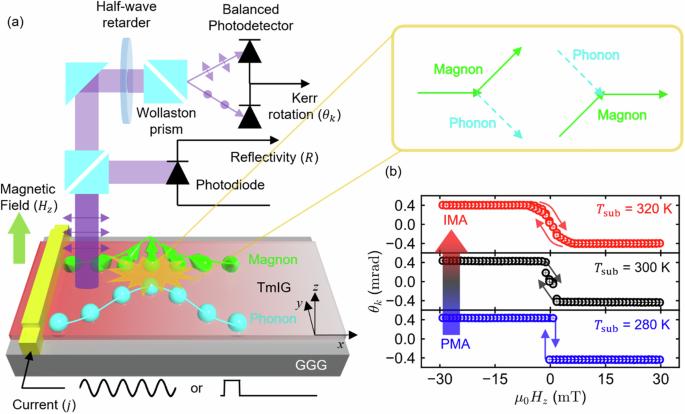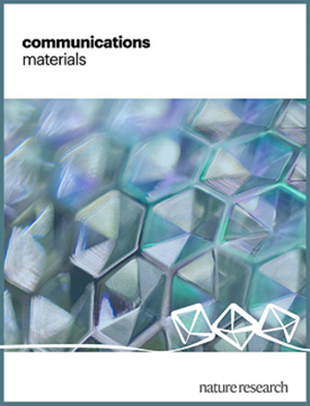Magnetic control of phonon transport in magnetic insulator thulium iron garnet
IF 9.6
Q1 MATERIALS SCIENCE, MULTIDISCIPLINARY
引用次数: 0
Abstract
The coupling between magnons and phonons and the associated phenomena have long been a focus of research in condensed matter physics. Contrary to its recognized role in magnon relaxation, its impact on phonon transport remains largely unexplored. Here, we fill this gap by investigating the effect of magnon-phonon coupling on phonon excitation, relaxation, and transport with magneto-optical reflectometry. Through simultaneous measurements of magnon and phonon populations in magnetic insulator thulium iron garnet, we observe the excitation of excessive phonons driven by non-equilibrium magnons, demonstrating the magnetic control of phonons. Furthermore, our time-resolved experiments reveal the magnetic field-dependent phononic thermal conductivity, signaling the potential of magnetic manipulation of heat transport. Our finding indicates that phonons can be controlled by magnetic means through magnon-phonon coupling and thereby opens a new avenue to harness magneto-thermoelectric effects in magnetic insulators. The coupling between magnons and phonons is an important aspect of condensed matter physics, but most research is related to magnon relaxation effects rather than the impact on phonon transport. Here, the effect of magnon-phonon coupling on phonon excitation, relaxation, and transport is investigated by time-resolved magneto-optical reflectometry.

磁性绝缘体铥铁榴石中声子传输的磁控制
长期以来,磁子与声子之间的耦合及其相关现象一直是凝聚态物理学的研究重点。与公认的磁子弛豫作用相反,它对声子传输的影响在很大程度上仍未被探索。在这里,我们利用磁光反射仪研究了磁子-声子耦合对声子激发、弛豫和传输的影响,从而填补了这一空白。通过同时测量磁绝缘体铥铁榴石中的磁子和声子群,我们观察到非平衡磁子驱动的过度声子激发,证明了声子的磁控制。此外,我们的时间分辨实验还揭示了与磁场相关的声子热导率,表明磁性操纵热传输的潜力。我们的发现表明,声子可以通过磁子-声子耦合以磁力手段进行控制,从而为利用磁绝缘体中的磁热电效应开辟了一条新途径。磁子与声子之间的耦合是凝聚态物理学的一个重要方面,但大多数研究都与磁子弛豫效应有关,而不是对声子传输的影响。这里,我们通过时间分辨磁光反射仪研究了磁子-声子耦合对声子激发、弛豫和传输的影响。
本文章由计算机程序翻译,如有差异,请以英文原文为准。
求助全文
约1分钟内获得全文
求助全文
来源期刊

Communications Materials
MATERIALS SCIENCE, MULTIDISCIPLINARY-
CiteScore
12.10
自引率
1.30%
发文量
85
审稿时长
17 weeks
期刊介绍:
Communications Materials, a selective open access journal within Nature Portfolio, is dedicated to publishing top-tier research, reviews, and commentary across all facets of materials science. The journal showcases significant advancements in specialized research areas, encompassing both fundamental and applied studies. Serving as an open access option for materials sciences, Communications Materials applies less stringent criteria for impact and significance compared to Nature-branded journals, including Nature Communications.
 求助内容:
求助内容: 应助结果提醒方式:
应助结果提醒方式:


